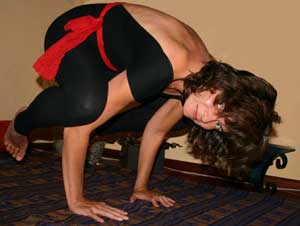 Could you imagine a day when you would be able to wake up and consciously decide to be happy? Could you imagine a time when you would be so much in control of your own mind, that no worries, disturbance or misfortune could throw you off balance? Could you imagine how powerful you would be if you are in control of your own thoughts and your own emotions?
Could you imagine a day when you would be able to wake up and consciously decide to be happy? Could you imagine a time when you would be so much in control of your own mind, that no worries, disturbance or misfortune could throw you off balance? Could you imagine how powerful you would be if you are in control of your own thoughts and your own emotions?In the pursuit of happiness, some 5,000 years ago the first Vedas were written in India - scriptures with rules underlining all yoga systems today.
Reading the five major principles of the system, I cannot but see the strong connection between yoga and all the health systems found in today’s modern world.
The first principle is Proper Relaxation – Hundreds of magazines come up with hundreds of recipes for proper relaxation: relaxation is our natural state – we tense because we get out of this natural state. Walking, bathing, massage, resting are just a few of them, one can come up with, in search for a relaxed body that will lead to a quite mind. We close as we age – physically and emotionally, and as we refuse to change, our body gets stiffer. If you close your eyes and remember yourself when you were younger, you could easily take in the lightness of your being, your chest will open, your breath will become deeper, and love and flexibility will enter your body, together with the enchantment of relaxation.
The second rule is Proper Exercise. You are probably saying, I’ve heard this before, but I promise these are the rules you will find in any yoga book, and they ARE 5,000 years old. Our body is very mechanical and we need to give it a proper treatment. We need to take responsibility for its proper maintenance. We need to lubricate it, fuel it, and run it – not too fast, as not to break the mechanism, nor too slow, so that the mechanism doesn’t start to rust. We need to learn our body’s response to exercise and to apply and to apply the best exercise to its parts – an exercise that will stretch and properly build our mussels muscles, also challenge and shape our bodies in the best possible way. We are all unique and there is no single formula that applies to each and every one of us, we need to listen to our body, learn its secrets, and work with what we have learned. Exercise can work wonders – it can bring you out of a depression and lethargy, it can help you develop the necessary posture, or give you an extra push to enjoy life even more.
The third rule is Proper Breathing. I tried to remember this the last time I was at my dentist, Ivan, and I realised that no matter how conscious I was, I would completely stop breathing every time I was afraid. We do that in every single situation in life – we either breathe faster or slower depending on what’s in front of us. Yoga has developed a whole science of breathing, that is, how one should breathe in different situations. Yogis even claim that with a particular type of breathing they could overcome gravity and start levitating. You don’t need to learn how to levitate, it is enough to be aware that a deep breath will bring you relaxation and that with altering your breath you could alter your state of mind.
The forth rule is Proper Diet. Here we go again – lots of water, lots of veggies, lots of fruit, balanced intake of vitamins, minerals, metals, no pesticides, no conservatives, no poisons, no stimulants, no sugars, etc, etc – I am sure you’ve heard this before…
The fifth and the last principle is Positive Thinking and Meditation. Now, here we get all confused and we start mixing up terms, methods and paths. Positive thinking is OK, but meditation? Yes, meditation! Meditation is not only for the privileged, religious or crazy. It is not only about endlessly repeating mantras, words that only a few really understand, but it is also about paying attention – being fully present – free of the past and the future, about developing concentration and focus, learning how to stop the flow of useless thoughts, walking next to the sea or observing a flower or listening to children’s laughter. It can be applied to all areas of life. Meditation is a tool on a path of inner peace.
And this brings us back to the very beginning, that is, to the pursuit of happiness.
Yoga is a living science encompassing many aspects of physical, mental, emotional and psychological education, so I find it really hard when people tell me – I practice yoga for its physical benefits, and its philosophy does not interest me. Is it possible that there is anybody on Earth who is not interested in the pursuit of happiness? No, surely not!

2 comments:
We should consider every day lost on which we have not danced at least once. And we should call every truth false which was not accompanied by at least one laugh.
Friedrich Nietzsche (1844-1900)
lots of love to you! :)
all I can say is that I cant wait to get back and start relaxing with you,
Post a Comment